Can I Sue My Job for Emotional Distress? Know Your US Rights
Wondering, “Can I sue my job for emotional distress?” If you’re a US worker facing workplace stress, harassment, or unfair treatment, it’s a valid question. At SarkariJobDoor.com, we’re committed to empowering you with knowledge about your workplace rights while connecting you to better job opportunities. Suing an employer for emotional distress is possible, but it depends on specific circumstances and US laws. Let’s explore when you can take legal action, how to proceed, and how to find healthier work environments.
What is Emotional Distress in the Workplace?
Emotional distress refers to severe mental or emotional suffering caused by workplace conditions, such as harassment, discrimination, or retaliation. In legal terms, it’s often called Intentional Infliction of Emotional Distress (IIED) or Negligent Infliction of Emotional Distress (NIED). Examples include:
- Persistent bullying or harassment by a boss or coworker.
- Discrimination based on race, gender, or disability.
- Retaliation for reporting workplace issues, like unsafe conditions.
To sue successfully, you must prove the employer’s actions were extreme, intentional (or negligent), and caused significant distress, often requiring medical documentation (e.g., therapy records). Can I Sue My Job for Emotional Distress
US Laws Protecting You
Several federal and state laws may support your case:
- Title VII of the Civil Rights Act: Protects against workplace discrimination based on race, gender, or religion, which can cause emotional distress.
- Americans with Disabilities Act (ADA): Covers mental health conditions if they qualify as disabilities, requiring employers to provide accommodations.
- State Laws: States like California have stricter laws, allowing claims for emotional distress under workers’ compensation or civil lawsuits.
- Workers’ Compensation: In some cases, emotional distress tied to workplace injuries may qualify for benefits.
However, in “at-will” employment states (most of the US), employers can terminate you for any reason unless it violates protected rights. Proving emotional distress often requires strong evidence, like emails, witness statements, or medical records.Can I Sue My Job for Emotional Distress
When Can You Sue?
You may have a case if:
- The employer’s actions were outrageous or intentional (e.g., targeted harassment).
- You suffered severe emotional harm, backed by medical or psychological evidence.
- The distress stems from illegal actions, like discrimination or retaliation.
Challenges include:
- High legal thresholds for IIED claims, requiring “extreme and outrageous” conduct.
- Costs of litigation, which may outweigh damages unless you win significant compensation.
Steps to Take
- Document Everything: Keep records of incidents, emails, and witness accounts.
- Consult HR: Report issues internally to establish a paper trail.
- Seek Legal Advice: Contact an employment lawyer to evaluate your case. Many offer free consultations.
- File a Claim: Submit complaints to the Equal Employment Opportunity Commission (EEOC) or your state’s labor board before suing.
- Explore New Jobs: If your workplace is toxic, find healthier opportunities on SarkariJobDoor.com.
Find Better Jobs with SarkariJobDoor.com
A toxic workplace isn’t worth your mental health. SarkariJobDoor.com lists US jobs in tech, healthcare, and government, where employee well-being is prioritized. From remote roles to flexible part-time positions, we help you find a workplace that respects you. Start exploring today! Can I Sue My Job for Emotional Distress
Take Charge of Your Career
If you’re considering suing for emotional distress, know your rights and gather evidence. Better yet, secure a job that values you. Visit SarkariJobDoor.com to discover opportunities and take control of your career! Can I Sue My Job for Emotional Distress

